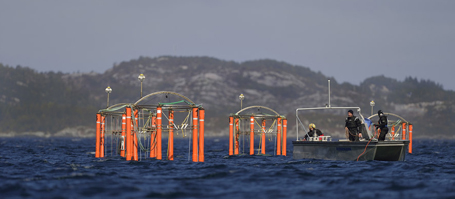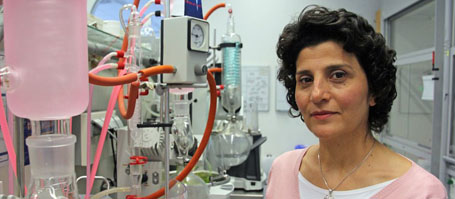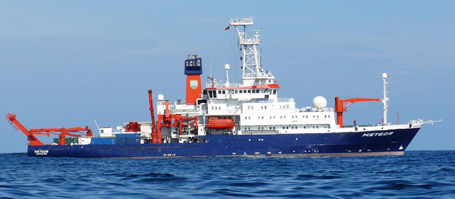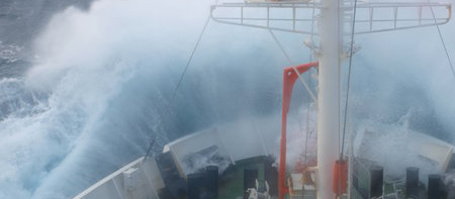As part of this study, which runs until the end of June in Raunefjord, Bergen (Norway), the researchers will transfer a laboratory-grown calcifying alga adapted to ocean acidification into the mesocosms. They hope to find out whether their laboratory results on the evolutionary adaptation of Emiliania huxleyi, the world’s most common single-celled calcifying alga, can be extrapolated to the natural environment.
From tiny pico-phytoplankton to fish and larger marine life: A complex community with all its interrelationships and global functions may get out of balance if the ocean’s acidity keeps increasing through the uptake of carbon dioxide (CO2) from the atmosphere. While the chemical reactions are well understood, important new questions about their impacts on the marine ecosystem as well as their economic and social consequences arise.
To answer these questions, a team of scientists from GEOMAR Helmholtz Centre for Ocean Research Kiel set out to the Raunefjord in Bergen (Norway). Using the KOSMOS mesocosms (KOSMOS: Kiel Offshore Mesocosms for Future Ocean Simulations), they examine an essential section of the ecosystem: The eight experimental constructions floating in the fjord enclose a natural plankton community in their 20-meter-long plastic bags. In four of the isolated worlds the carbon dioxide level is gradually increased. Until the end of June, the scientists collect and analyze water samples almost daily, measure physical and chemical parameters and document the development of the plankton community. “With more than 50 parameters measured throughout the experiment, we can put together a comprehensive picture of the responses of the enclosed community to ocean acidification”, explains Prof. Dr. Ulf Riebesell, professor of Biological Oceanography at GEOMAR and coordinator of KOSMOS experiments. “This will allow us to make the connection from organism responses to food web and biogeochemical implications and from short-term reactions to evolutionary adaptation.”
For the first time, individuals of the world's most important single-celled calcifying alga Emiliania huxleyi that have adapted to more acidified conditions in the laboratory are introduced to the mesocosms. This unicellular organism plays a crucial role for the transport of carbon to the deep ocean – and thus for its ability to store carbon and mitigate climate change. Also, these calcifying algae produce the climate-cooling gas dimethylsulphide (DMS). “In laboratory experiments with isolated species, we could show that Emiliania huxleyi is able to adapt to both ocean acidification and rising water temperatures through evolution”, says Dr. Kai Lohbeck from GEOMAR.
On the other hand, a previous KOSMOS study in the Raunefjord brought the surprising result that Emiliania huxleyi could no longer prevail in the food web at more acidified conditions. “In this field experiment, we will examine whether the adaptation in the laboratory serves as an competitive advantage even under natural conditions and whether this allows the algae to maintain their ecological niche in an acidifying ocean.”
In order to offer a hands-on training to the next generation of young scientists, five Master's theses are embedded in the study. With the help of experienced researchers, graduates investigate the development of pteropods and herring larvae under changing environmental conditions, assess whether pico-phytoplankton adapts through evolution and determine the food quality available to higher trophic levels in the future. In addition, 15 students from Kiel University are involved in the work at the Marine Biological Station “Espeland” of Bergen University. “The cross-cutting approach of the KOSMOS studies gives the students a unique chance to place their own investigations in a larger context and to better understand their results”, Riebesell points out. “Working as a team and living closely together at the research station also make the special appeal of these studies.”
The participants blog about their work in the Kiel Marine Sciences portal Oceanblogs.org.
Links:
The blog about the “KOSMOS 2015” experiment
Contact:
Maike Nicolai (GEOMAR, Communication & Media), Tel.: (+49) 0431 600-2807, presse@geomar.de
…



